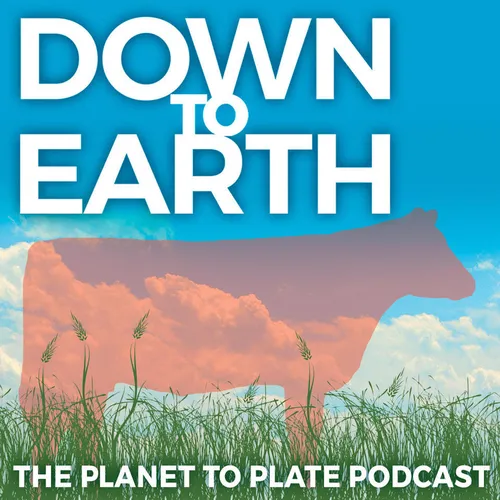
Down to Earth: The Planet to Plate Podcast
Down to Earth is a podcast about regenerative agriculture, and it’s for everyone who eats. We invite you to meet the people shaping a healthier food system—farmers, ranchers, scientists, land managers, writers, and many others. Designing a future that draws on both tradition and innovation, they’re on a mission to change the paradigm so that the food we eat is healthy and long-term sustainable—for families and growers, for wildlife and water, for climate and planet. downtoearthradio.com
- Update frequency
- every 13 days
- Average duration
- 50 minutes
- Episodes
- 104
- Years Active
- 2021 - 2025

Technology-assisted regeneration
Industrial agriculture imposes a simplified production model onto complex ecosystems––with dire consequences. In the new book, The Great Regeneration: Ecological Agriculture, Open-Source Technology, …

Wolves in the West: Finding common ground
After being driven almost to extinction, wolves are back in some of their natural habitat. A new podcast, Working Wild University, explores how ranchers, conservationists, and others are coming toget…

De-commodifying land: Challenging your inner capitalist
The price of land keeps going up across the country as wealthy investors buy farmland and people move out of cities. This puts untenable pressure on farmers and land stewards who are producing health…

Healing Grounds: The enduring cultures of regenerative agriculture
Liz Carlisle's new book, Healing Grounds: Climate, Justice, and the Deep Roots of Regenerative Farming, is a fascinating exploration of food, agriculture, and cultural traditions of the North America…

Innovative approaches to regeneration on a California ranch
TomKat Ranch manager Mark Biaggi talks about dealing with winter floods, summer droughts, and degraded landscapes––and the process of continual experimentation that leads to dramatic regeneration of …

Giant bison, mammoths, and eagles
66 million years ago an asteroid struck earth, causing the fifth mass extinction of species on earth. With the dinosaurs gone, new species proliferated all over the planet. Now we're in the sixth ext…

Sustainable development, climate mitigation, and biochar
Brando Crespi has devoted decades to sustainable development as co-founder and Executive Chair at Pro Natura International and Global Biochar. His holistic approach to sustainable development could b…

Bringing dead land back to life
John D. Liu started his career as a journalist and cameraman, covering politics, economics, and culture. In 1995, he began documenting the Loess Plateau in China, a massive landscape that had been de…

Desert wisdom: sustaining Southwest agriculture using old ways––and new
Gary Paul Nabhan, known by many as the "father of the local food movement," is a prolific author, scientist, and activist for a healthy and truly regenerative food system that respects the land and i…

A vibrant pecan oasis in the desert
Coley Burgess grew up on a conventional farm, then studied mathematics and electrical engineering...and he brought his scientific rigor and curiosity to a 20-acre pecan farm that he and his family bo…

The food-housing nexus
Professor Phillip Warsaw's work is all about the interconnectedness of the systems that keep our lives going––food, housing, transportation, health care. In his research in Milwaukee he discovered t…

Leveling the growing field
If you're a small or mid-size farmer, it's nearly impossible to compete against giant food conglomerates. But fairer policy could help smaller farms to prosper, provide healthy food and thriving comm…

Big Team Farms––a new economic model?
Both big ag and small family farms have their problems...but what's the alternative? We talk with agricultural journalist Sarah Mock about the some possible models.

The USDA goes after a small sheep farm
Linda and Larry Faillace spent years at the University of Nottingham in England, where Linda became an expert in Mad Cow Disease (BSE). Upon return to the U.S., they imported sheep from Europe, with …

Making your tax dollars work after fires and floods
Congresswoman Teresa Leger Fernandez (D-NM-3), a native of Las Vegas, NM, deeply understands the challenges and strengths of rural people in northern New Mexico. She's been working to bring money to …

Place, Power, And Purpose
Bees date back over 10,000 years on the American continent and are vital to the health of almost every bite of food we eat, but today they face threats from industrialization and habitat fragmentatio…

What's good for the farm is good for the planet
During Carol Ekarius's early years in Colorado, the Buffalo Creek Fire burned just under 12,000 acres — and at the time was considered a huge, catastrophic fire. Now fires in the west are consuming h…

What is Your Foodprint?
We all know the term carbon "footprint." Well, Foodprint takes this idea and broadens it to apply to our food system; they explore how the foods we eat affect not only carbon emissions, but a whole r…

Kiss the Ground: A project born of devotion to the earth
Ryland Engelhart came from a family of vegans and vegetarians and knew early on that he wanted to devote his life to the health of the planet. Once he began to see that there is no food –– no life at…

Food, forests, and farms
Most of the American Midwest was once a vast savanna, an open grassland with abundant trees and wildlife. As the land was converted to agriculture many of the trees were lost, and with them went coun…